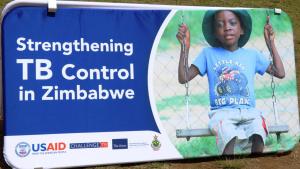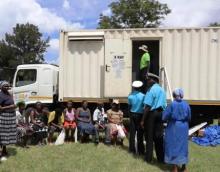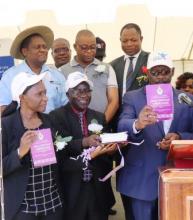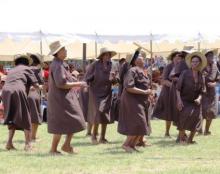Call made for Leaders for a TB free Zimbabwe
The call was made during the commemoration of World TB Day which was held at Dzivarasekwa Stadium in Harare. Globally, World TB Day is commemorated on the 24th of March each year, and Zimbabwe joined the rest of the world to commemorate it under the theme “Wanted: Leaders for a TB-free world” The theme emphasises the need to build leadership commitment to ending TB, not only at political level with the Head of State, Ministers and parliamentarians, but at all leadership levels, including traditional, religious and other community leaders.
In her statement, WHO Representative a.i. Dr Juliet Nabyonga commended the progress made by the Ministry of Health and Child Care towards addressing the problem of TB in the country, but called for increased participation by all leaders in TB control. “The Zimbabwean government and parliament have provided exemplary leadership in the fight against TB and I would like to urge them to keep driving ambitious plans that will accelerate TB control at national level,” she said. Dr Nabyonga, however, urged the government of Zimbabwe to scale up domestic funding for TB control and take responsibility for essential medicines and laboratory supplies; and to continue pushing for universal coverage with proven high quality services. She also said that since TB is found in communities where human rights and dignity are often overlooked, especially in prisons, mines and other congregate settings, the government should continue pursuing actions beyond the health sector to address environmental, economic and other factors which increase the risk of TB. She then reiterated WHO’s commitment to support the Zimbabwe government’s commitment to end TB in the country.
In his statement, the Honourable Minister of Health and Child Care, Dr David Parirenyatwa said his Ministry is committed to improving the quality of life for all Zimbabwean citizens and have, in line with this commitment, made TB treatment accessible to all free of charge at the point of service delivery. He said Zimbabwe has made great strides in combating TB where estimated TB incidence declined to 208 per 100,000 in 2016 compared to a peak of 617 per 100,000 in 2003 and a rate of 242 per 100,000 in 2015. Out of the 28,225 cases diagnosed in 2015, 81% were successfully treated, although this has remained the stagnant versus a target of 90%. The results of the Zimbabwe Drug Resistance Survey of 2015 also showed that the burden of Drug Resistant TB is 4.2% and 14.2% among new and retreatment cases respectively. “HIV testing in TB patients stands at 96% and ART coverage was 86% in 2016; a commendable feat considering the fact that Zimbabwe is among the 30 high burden countries for TB, TB-HIV & MDR TB and that the Zimbabwe TB epidemic is largely HIV-driven with a co-infection rate of 67%,” said Dr Parirenyatwa. The Honourable Minister acknowledged the political commitment demonstrated by Zimbabwe’s policy makers who have taken bold steps in placing TB on the political agenda through the establishment of a National TB Caucus and the signing of the Barcelona declaration. This, he said, harmonizes with this year’s theme which seeks such committed leaders who can push the TB Agenda.
Dr Parirenyatwa used the occasion to launch the revised MDR-TB Treatment Guidelines which reduce the duration of treatment from 24 months to 9-12 months. It is hoped that the reduced duration of treatment will improve adherence and reduce incidences of defaulting.
The population of Dzivarasekwa and its environs got a chance to be screened for TB, HIV, and diabetes before, during, and after the launch. There is an increasing link between TB, HIV, and diabetes in Zimbabwe. There were counselling tents, HIV testing tents, TB screening tents and the Ministry of Health’s mobile X ray van was in the stadium and hundreds of residents had chest X rays taken to ascertain the presence of TB in the lungs.







